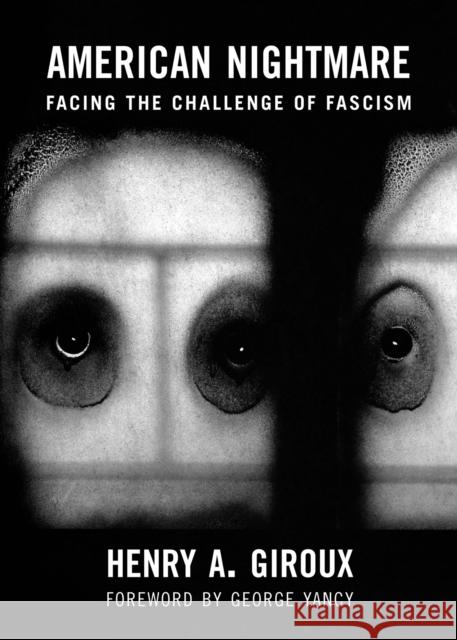American Nightmare: Facing the Challenge of Fascism » książka



American Nightmare: Facing the Challenge of Fascism
ISBN-13: 9780872867536 / Angielski / Miękka / 2018 / 384 str.
American Nightmare: Facing the Challenge of Fascism
ISBN-13: 9780872867536 / Angielski / Miękka / 2018 / 384 str.
(netto: 74,49 VAT: 5%)
Najniższa cena z 30 dni: 77,28 zł
ok. 13-18 dni roboczych.
Darmowa dostawa!
A far-ranging critique of the rise of authoritarianism and white nationalism in the US and the consequences for democracy
Praise for American Nightmare:
"Giroux eloquently yet forcefully makes the case that the United States has indeed become a fascist state, embodying many of the characteristics of the regimes of the 20th century as well as current prototypes. ... Giroux argues Trump and his Trumpists not only emulate regimes of the past, but also bring to the table a new corporate authoritarianism that perpetually normalizes white supremacy, ignorance of the masses and massive concentrations of wealth in the hands of the few. ... American Nightmare is not only a conceptual analysis of fascism in the U.S., but also a massive wake-up call to the left."-Winnipeg Free Press
"Overall, this work is a highly articulate demolition of the Trump agenda, which comprehensively and briskly covers the many high crimes and propaganda tactics of an avowedly plutocratic, authoritarian administration."-New York Journal of Books
Praise for America at War with Itself by Henry A. Giroux:
"It is all but impossible to do justice to the value of this tapestry of explication and insight, essential elements to a broadened and deepened awareness of the horrific political and economic developments that are unfolding in American and elsewhere"-Ned Haggard, Chicago Life Magazine (distributed in the Sunday New York Times)
"Giroux manages to link together almost every dysfunctional aspect of American society in a cohesive account that is really important to read"-Tikkun
"This is the book Americans need to read now. No one is better than Henry Giroux at analyzing the truly dangerous threats to our society. He punctures our delusions and offers us a compelling and enlightened vision of a better way. America at War with Itself is the best book of the year."-Bob Herbert, Distinguished Senior Fellow at Demos and former Op-Ed columnist for the New York Times
"Giroux prescribes ways to teach critical thinking . . . his argument for active citizenship is important and stimulating."-Booklist
"In America at War with Itself, Henry Giroux again proves himself one of North America's most clear-sighted radical philosophers of education, culture and politics: radical because he discards the chaff of liberal critique and cuts to the root of the ills that are withering democracy."-Olivia Ward, Toronto Star
Introduction: Staring into the Authoritarian Abyss
Chapter 1. America's Nightmare: Remembering Orwell's 1984 and Huxley's Brave New World.
Chapter 2: Authoritarianism and the Legacy of Fascist Collaboration.
Chapter 3. Beyond the politics of Incivility.
Chapter 4. The Culture of Cruelty in Trump's America
Chapter 5. State Violence and the Scourge of White Nationalism
Chapter 6. Toward a Politics of Ungovernability under U.S. Authoritarianism
Conclusion. Democracy in Exile and the Politics of Resistance.
Acknowledgements
Notes
Bibliography
Index
Henry A. Giroux is a world renowned educator, author and public intellectual. Giroux holds the McMaster University Chair for Scholarship in the Public Interest, and is the Paulo Freire Distinguished Scholar in Critical Pedagogy. His most recent books include, America at War with Itself (City Lights, 2016) Disposable Futures: The Seduction of Violence in the Age of Spectacle with Brad Evans (City Lights 2015); The Violence of Organized Forgetting (City Lights 2014); Zombie Politics and Culture in the Age of Casino Capitalism (Peter Lang, 2011); On Critical Pedagogy (Continuum, 2011); Education and the Crisis of Public Values (Peter Lang 2012); Twilight of the Social: Resurgent Publics in an Age of Disposability (Paradigm Publishers, 2012); Disposable Youth (Routledge 2012); Youth in Revolt (Paradigm, 2013); America's Education Deficit and the War on Youth (Monthly Review Press, 2013) A prolific writer and political commentator, he writes regularly for Truthout and serves on their board of directors.
He lives in Hamilton, Ontario, Canada with his wife, Dr. Susan Searls Giroux.
George Yancy is Professor of Philosophy at Emory University. He is the author, editor and co-editor of over 18 books. He has authored numerous scholarly articles and chapters. He is known for his influential essays and interviews in the New York Times' philosophy column, The Stone.
1997-2024 DolnySlask.com Agencja Internetowa
KrainaKsiazek.PL - Księgarnia Internetowa









